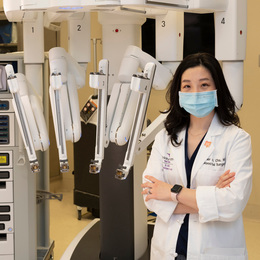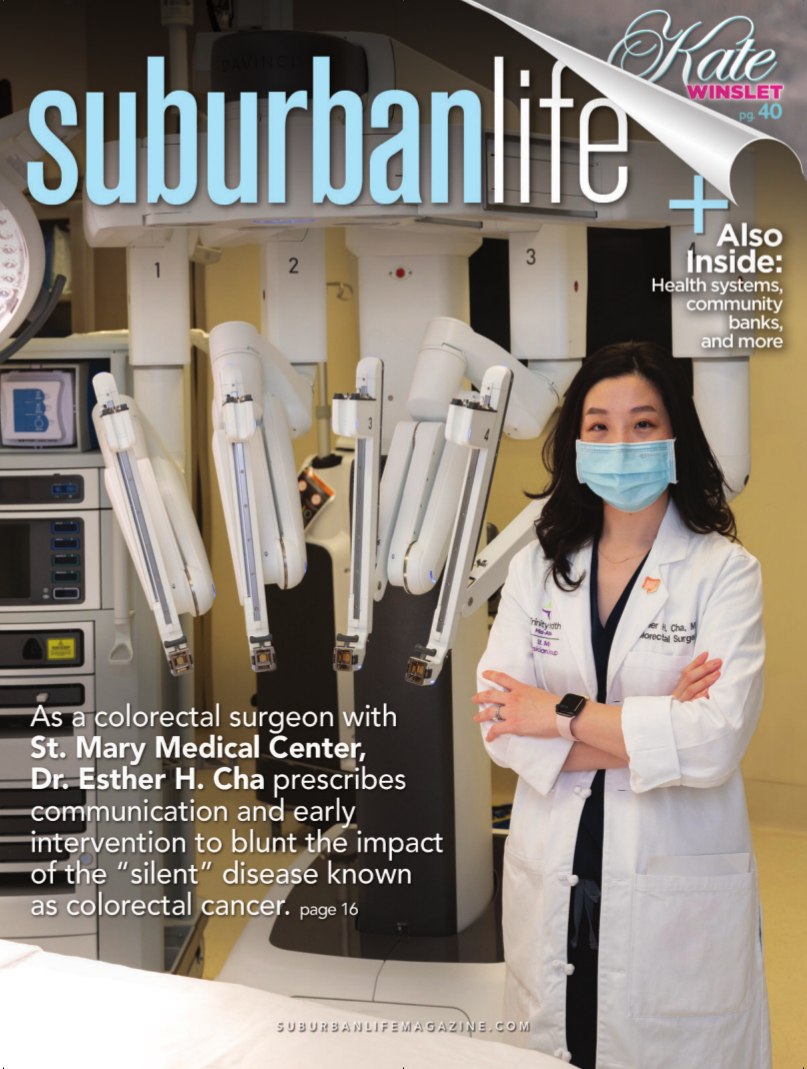
Shining Light in Darkness
As a colorectal surgeon with St. Mary Medical Center, Dr. Esther H. Cha prescribes communication and early intervention to blunt the impact of the “silent” disease known as colorectal cancer.
Esther H. Cha, M.D., talks freely to patients about some of the most intimate aspects of their private lives. As a colorectal surgeon at St. Mary Surgical Associates in Langhorne, she cannot afford to be shy; her patients’ health—and even their lives—may depend on it.
Colorectal cancer is the third leading cause of cancer-related deaths in American adults, and the second most common cause of cancer deaths among men and women combined, according to the American Cancer Society. The disease is expected to have claimed more than 52,000 American lives by the end of 2021. Such sobering statistics may explain why Dr. Cha is so adamant about prevention by way of colonoscopy, which is considered the standard of care.
“The new phrase is that 45 is the new 50,” she says. “The guidance used to be that age 50 was when you would get your first colonoscopy. More and more, we are realizing that younger and younger patients are being diagnosed with late-stage disease. Colorectal cancer is one of the most preventable and curable diseases when you catch it early. The key is to catch it early.”
To her point, the American Cancer Society issued new guidelines in 2018 that suggest the recommended screening age be decreased from 50 to 45. The change stems from a data analysis showing colorectal cancer occurring at an increasing rate among younger adults. St. Mary has board-certified gastrointestinal specialists on staff who can provide these screenings. Dr. Cha encourages patients to speak to their family doctor, gastroenterologist, or colorectal surgeon about these new recommendations. “These patients are younger and younger, and they’re getting a screening and being told, ‘You have a mass,’” she says. “One of the tricky things is that colorectal cancer is a very silent disease. By the time you have noticed changes in your stool, you feel bloated, or you are not tolerating food the way you used to, these are signs of more advanced disease.”
Dr. Cha likes to remind patients that screenings are safe and largely painless, as patients are asleep during the procedure. She also recommends every patient get to know his or her family history before they turn 45, because the incidence of polyps or colorectal cancer in other family members may put an individual at a higher risk. She enjoys talking to patients about nutrition and healthy eating, including the benefits of a high-fiber diet. Conversations about such delicate topics may be difficult for some, but they have the potential to save a life.
For anyone whose screening indicates the presence of colorectal cancer, St. Mary has a tumor board made up of medical professionals from various areas of specialty who gather to discuss patients’ cases and determine the optimal path forward in terms of a treatment plan. When applicable, the medical center can offer robotic-assisted laparoscopy to resect, or remove, the disease. Dr. Cha suggests the benefits of robotic-assisted surgery include better patient outcomes—namely, reduced postoperative pain, shorter hospital stays, and a lower risk of infection—due to the minimally invasive nature of the surgery.
“The robotic surgical system is like driving a Tesla in the OR, in that it enables the surgeon to perform the surgery very accurately,” she adds. “Prior to my arrival [at St. Mary], the procedure was done with an open technique, which requires a longer hospital stay, more narcotic painkillers, and a slower return to baseline activity. The incisions are getting smaller and smaller—as small as five centimeters for a robotic-assisted laparoscopy—and most people leave the hospital at day three. As a result, the satisfaction rates are higher, without jeopardizing the oncologic factor.”
Once a patient has been effectively treated for the disease, the surveillance continues. If the cancer returns, it often does so within two years of the surgery, according to Dr. Cha.
She’s proud to serve patients at a community hospital such as St. Mary, which has invested heavily in patients’ health by way of technology and human talent. St. Mary Surgical Associates’ surgical team has grown to include not only Dr. Cha, but also three general surgeons and a bariatric surgeon, all of whom have received training in robotic-assisted surgery.
“We have a whole ecosystem here to help patients,” Dr. Cha says. “With the technology we have in place and having a fellowship-trained surgeon like me, patients [in Bucks County] don’t have to travel an hour downtown for care. Our hospital is equally capable, and we’re really excited to promote our team of very eager surgeons. It’s an exciting time for St. Mary.”
About Dr. Cha
As a young girl growing up in her native South Korea, Dr. Cha loved to listen to her father share stories about his work as an orthopedic surgeon. While her older sister pursued her talent in music, Dr. Cha felt a strong pull to follow her father into medicine. He had encouraged her to go into cardiology, but she had other ideas.
“From the beginning, I knew I wanted to be a surgeon; I just wasn’t sure what kind,” she says. “My father took pride in the fact that a patient gives a surgeon complete trust to do these amazing things to you, and when you wake up, you’re all better. My parents are dedicated Christians, and my dad talked about Jesus being a healer. As physicians, we get to participate in that tradition of healing.”
Dr. Cha came to the United States at age 12, speaking not a word of English, but she adapted quickly and became fluent in English and Korean. She won a scholarship to the University of Virginia, and then went on to earn her doctorate through Virginia Commonwealth University School of Medicine in Richmond, Virginia. She did her internship and residency at Medstar Union Memorial Hospital in Baltimore, where her interest in colorectal surgery intensified. She took her training a step further by completing a fellowship in colorectal surgery at the Colon and Rectal Clinic of Orlando, where she learned robotic-assisted surgery from pioneers in the field. In addition, she received certification in general surgery through the American Board of Surgery.
She came to the Philadelphia area when her husband, a neonatologist, got a position with Children’s Hospital of Philadelphia. Dr. Cha joined St. Mary Surgical Associates in September 2020. As a colorectal surgeon, she specializes in minimally invasive surgical techniques including laparoscopic, robotic, and endoscopic surgeries. She performs colorectal surgical procedures for benign and malignant disease, including techniques in transanal minimally invasive surgery for sphincter preservation and surgery for inflammatory bowel disease.
Call (215) 710-6613 to make an appointment with St. Mary Surgical Associates Langhorne. Visit www.trinityhealthma.org for more information.
Photograph courtesy of St. Mary Medical Center
Published (and copyrighted) in Suburban Life, May 2021.



